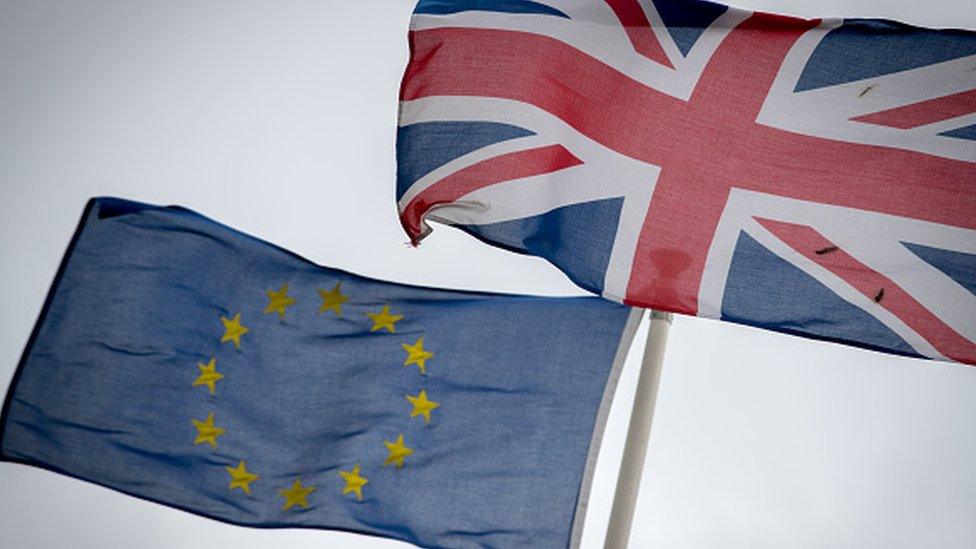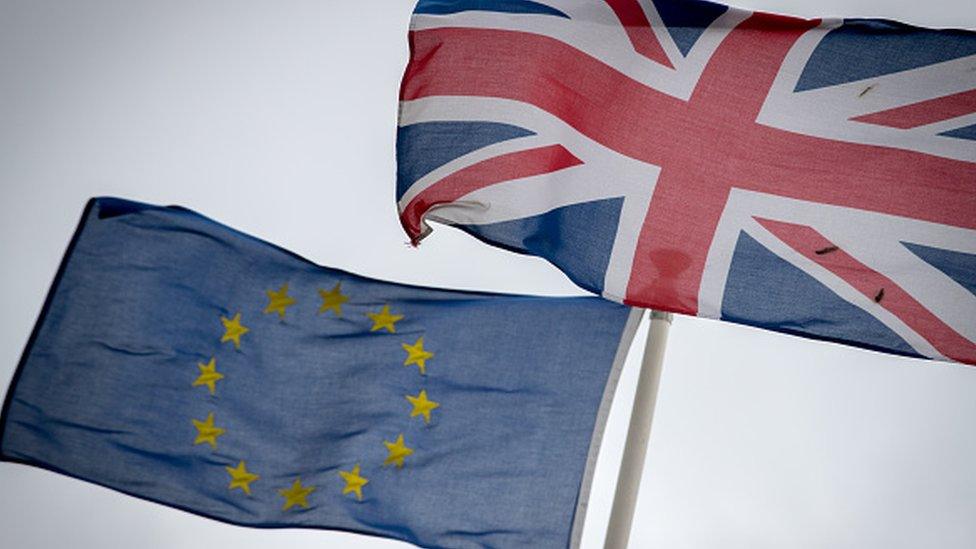Post-Brexit trade deals 'to create 400,000 jobs'
- Published

Nearly 400,000 jobs could be created as a result of post-EU trade deals with other countries, pro-Brexit campaign group Change Britain has claimed.
By leaving the EU's customs union, it said, the UK would be free to negotiate deals with the US, India, China, Japan, Canada, Korea and trading blocs in South America and South East Asia.
This, it said, would bring an estimated £23bn export boost and 387,580 jobs.
But the figures were dismissed as flawed and misleading by opponents.
Pro-EU campaigners said the statistics were based on the assumption of replicating EU deals with other countries that the UK would no longer be part of.
The UK would simply not be able to secure deals of a "comparative depth" to those negotiated by the EU after Brexit.
Change Britain, which grew out of the Vote Leave campaign group, is pressing for a so-called "hard Brexit", where the UK pulls out of the single market and the customs union when it leaves the EU. It says this will give it flexibility to negotiate the most beneficial trade arrangements with the rest of the world.
Its research, external is based on 2012 calculations by the European Commission about the boost to exports and jobs in the EU as a whole if trade deals were struck with six leading economies and two major trade blocs, South East Asia's Asean and South America's Mercosur.
'Huge opportunities'
The EU's executive body concluded that for every 1 billion euros generated through extra exports, an estimated 16,700 jobs would be created.
Change Britain said the UK's share of these jobs would be 2,503 - which it reached by dividing the 16,700 figure by 14.99%, the UK's proportion of non-EU exports in 2015.
It then multiplied this by the estimated boost to exports to the EU as a whole of trade deals with the US (73,610 jobs), India (29,043), China (3,505), Korea (63,094), Japan (63,094), Canada (36,555), Mercosur (34,301) and Asean (84,376) to arrive at the 387,580 figure.
Ex-CBI boss Digby Jones defended the figures, saying the US, India, China, Canada, South Korea and Mercosur had publicly expressed interest in post-Brexit trade deals which, at the very least, could generate more than 240,000 jobs.
Lord Jones, a Change Britain supporter, said it was "reasonable to assume" there would also be deals with Japan and Asean and that the UK would also continue to trade on a tariff-free basis with the EU after Brexit.
"The only way we can make the most of these huge opportunities is to leave the EU's customs union and take back control of our trade policy," he said.
"This will create hundreds of thousands of new jobs in a range of industries right across the UK."
'Fictional'
The EU concluded free trade deals with South Korea in 2015 and Canada last year after protracted negotiations, while it is in the process of negotiating agreements with Japan, the US and India.
Labour MP Phil Wilson, a supporter of Open Britain, said it was questionable whether the UK would be able to "retain" the economic benefits it currently enjoyed through these deals once it left and had to negotiate bilateral agreements of its own.
"These misleading fantasy figures underline the weakness of the case for leaving the EU," he said. "They take no account of the unavoidable costs that would arise and look at the UK's supposed share from EU trade deals we will not be part of."
And Jonathan Portes, professor of economics at King's College London, said the figures were "entirely fictional".
He told the BBC that leaving the customs union - which allows goods to circulate freely during the EU's wider trade area, encompassing countries such as Turkey - would result in "checks on goods passing between Calais and Dover".
"There may be advantages in the long run leaving the customs union but in the short term it means a lot of extra bureaucracy," he told BBC Radio 4's Today programme.
- Published3 January 2017

- Published30 December 2020

- Published28 December 2016

- Published24 November 2016
